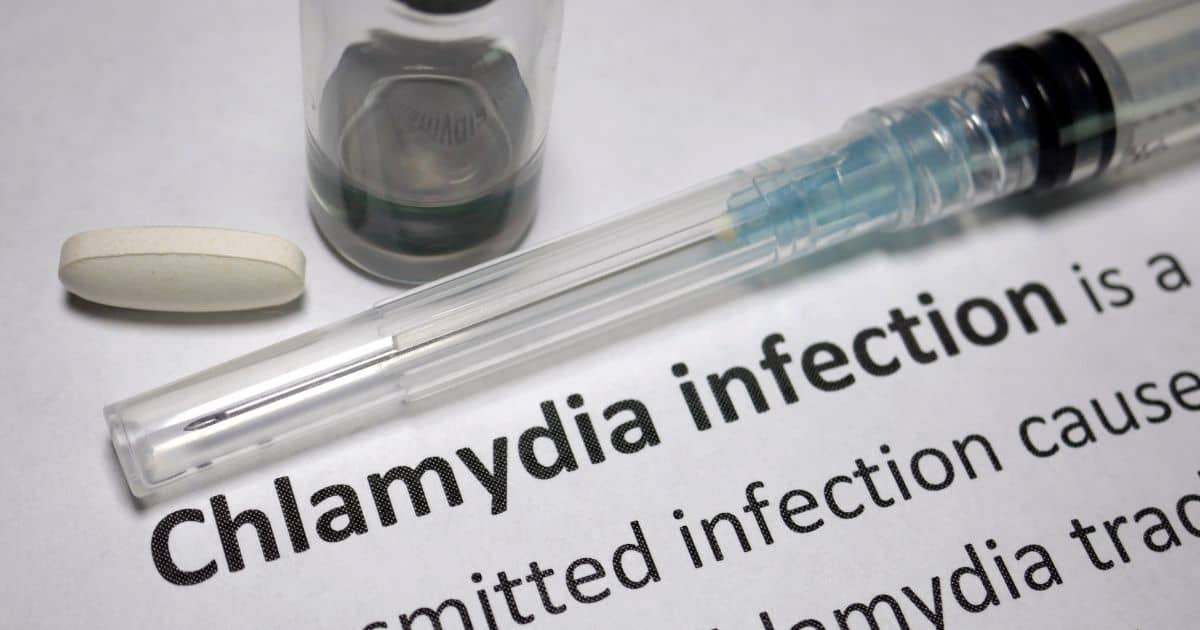Did you know it’s possible to get chlamydia in the throat? The condition is called oral chlamydia and it produces distinctive symptoms that make it different from the widespread genital chlamydia.
What’s Oral Chlamydia and How Do You Get It?
Oral chlamydia can infect both the mouth and the throat. It is caused by the Chlamydia trachomatis bacterium – the same one that leads to genital chlamydia during unprotected oral sex.
The most common way to get oral chlamydia involves performing oral sex on someone. It’s also very important to note that people who have oral chlamydia and perform oral sex on their partners can pass on the bacterium and give their significant others genital chlamydia.
Current research suggests that oral chlamydia cannot be passed from one person to another during a kiss.
You’ve probably figured out already that this kind of chlamydia is less widespread than genital chlamydia. Studies show that approximately 15 per cent of all people who visit sexual health clinics test positive for genital chlamydia. When it comes to oral chlamydia, the number is reduced to 1.5 per cent of all visitors.
Main Symptoms
Many people aren’t going to suspect a sexually transmitted infection when they experience the symptoms of oral chlamydia.
That’s because we are all anticipating genital symptoms like itching, burning, pain during intercourse or unusual discharge.
Oral chlamydia produces symptoms that are very similar to the symptoms experienced with any other throat infection. Some of the most common signs include:
- A sore throat
- Mouth pain
- Open sores in the mouth that don’t heal for long periods of time
- Sores around the lips
- Swollen lymph nodes on the neck
- White spots in the back of the throat
- Mouth and throat redness
- Swollen tonsils
- Dental problems
These symptoms usually occur within two to three weeks of having contact with an infected person.
Many of the people who get oral chlamydia will experience no symptoms whatsoever. This fact makes the oral condition very similar to genital chlamydia – anywhere between 31 and 60 per cent of people who have chlamydia aren’t going to experience symptoms.
Can Oral Chlamydia Lead to Complications?
While the primary symptoms are mild and easy to confuse with a cold, untreated oral chlamydia can eventually lead to some complications. In the long run, oral chlamydia can lead to serious dental problems. Gingivitis and periodontal disease are two of the most common complications.
Chlamydia can also spread to other parts of the body. In that instance, complications can include conjunctivitis and even reactive arthritis.
Having a chlamydia infection, be it oral or genital, increases the risk of also contracting other STDs. Research establishes a higher likelihood of an HIV infection in the event of active genital or oral chlamydia infections.
Who Is at Risk?
Just like genital chlamydia, the oral STD can affect anyone who chooses to have unprotected sex with a partner. The risk of becoming infected is increased whenever several factors are present.
People who have sex with multiple partners are at a higher risk of getting an STI, including oral chlamydia.
A few of the other risk factors include refraining from the use barrier contraception (a practice that’s recommended even for oral sex), becoming sexually active at a very young age and having another STD.
Diagnosis and Treatment
A swab test provides the most accurate screening opportunity. The mouth and throat will be swabbed to collect a sample for lab analysis later on. In the lab, technicians will look for the bacterium’s genetic material.
This test is very sensitive and it can detect even small quantities of the bacterium. Swab screening can be applied whenever chlamydia is suspected, be it genital, rectal or oral.
People who test positive for oral chlamydia will also be screened for a genital infection. It’s very common for the two to occur at the same time, increasing the range of symptoms and complications someone may experience in the future.
Because chlamydia is caused by a bacterium, the condition can be treated with antibiotics.
The same treatment protocols that apply to genital chlamydia will be used for the treatment of the oral condition. Doxycycline taken by mouth is the most popular treatment, followed by oral azithromycin.
A person who is being treated for oral or genital chlamydia should avoid sexual contact with their partner for the entire duration of the treatment. Doctors usually allow sexual activity about seven days after the completion of the antibiotic regimen.
Anyone who has been diagnosed and treated for chlamydia will need to inform their sexual partner(s0). These individuals will also need to undergo screening and the eventual administration of antibiotics in the event of a positive test.
Get Tested if You Are Sexually Active
Even people in a committed monogamous relationship are at a risk of contracting an STD.
That’s why health authorities recommend getting an STD testing panel at least once per year if you don’t belong to a high risk group. Those who have multiple sexual partners or refrain from using barrier contraception will need to get tested more often.
Men’s health clinics in Singapore like Shim Clinic offer accessible, confidential sexual health services. You can come to the clinic every day of the week to get tested and have a consultation about chlamydia or other conditions you’re worried about. If you don’t feel confident about a visit yet, contact Shim Clinic and we’ll give you all of the details you need.

